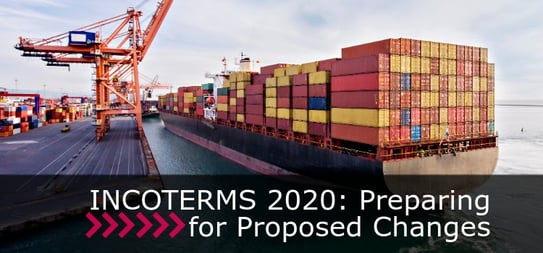
Any information that affects your freight is information that you should know. Are you aware of the proposed changes to Incoterms 2020?
Every ten years, the International Chamber of Commerce chooses to revise the Incoterms for international shipping. Since we have been working with the same Incoterms since 2010, expect to see some changes affecting your shipping terms as of January 1st, 2020.
While it is essential to be well-informed of all changes that affect the way you do business, keep in mind that nothing has been set in stone as of yet. Until the changes are announced sometime in September 2019, anything you see floating around is just educated speculation. That said, there has been a lot of speculation.
Proposed Changes to Incoterms 2020
Speculation for the proposed changes to Incoterms includes the elimination of certain elements alongside the introduction of new ones.
Speculated removal of Incoterms includes the axing of Free Alongside Ship (FAS). FAS currently allows the seller to leave their goods at the dock. It is only used for the exportation of limited commodities at this moment, and so it is very seldom addressed. The elimination of it would mitigate some risk on the part of the purchaser.
A new addition that we might see would cover a gap between FCA (Free Carrier) and CFR (Cost and Freight)/CIF (Cost, Insurance, and Freight). CNI is the speculated name for this new Incoterm, which would include the cost of international insurance. In this case, CNI would become an arrival term. This indicates that the risk would be transferred from the seller to the buyer at the port of departure.
It is well known that DDP (Delivered Duty Paid) generates problems when the Customs duty in the importing country are paid by the exporter and seller rather than by the place of delivered goods. If the two Incoterms based on DDP are released, this will alleviate some of these issues. In both cases of the speculated DTP (Delivered at Terminal Paid) and DPP, the seller assumes payment of Customs duties.
Speculation also dictates that the current FCA Incoterm will be unfolded into two separate terms. FCA is by far the most used Incoterm, with about 40% of international trade operations carried out under this term. It allows you to note the delivery of goods, wherever that may be.
The proposed change would split FCA between ocean shipments and air, road, and rail shipments. This change would help determine and settle liability and offer two different options for delivery to be paid.
How to Prepare for the Proposed Changes
The best way to prepare for these speculated changes is to become well-versed in the current version. By becoming intimately familiar with the current Incoterms, you will be able to comprehend the details of the proposed changes and how they will affect your business.
It’s recommended that you prepare for training sessions. Every facet of your organization will need to be aware of the current terms and what the new ones will be. Consider this an excellent opportunity to put your staff through a refresher course. Having one department set the terms on your shipment only to have another to change them due to a misunderstanding with regards to what the terms cover opens your business up to additional responsibility and costs.
Additionally, take a look at your current sales cycle. Depending on your turn-around time for manufacturing, you may be on the cusp of negotiating contracts that won’t be shipping until 2020. Be aware of whether the proposed Incoterm changes are going to make an impact on these shipments.
You may even find yourself in a situation where Incoterms 2020’s proposed changes will place your business at lower risk or save it some money. That said, you won’t know unless you inform yourself. In any case, it is in your best interest to know your Incoterms inside out.
The speculated Incoterms for 2020 have been thoroughly analyzed to determine where eliminations and alterations can be made. It is important to note that nothing is official as of yet, but these changes are the most likely scenario, and you should prepare your business accordingly.
Related Content: IMO 2020: What Shippers Need to Know
Be aware, be educated, and do your due diligence to make sure that you aren’t putting your business at risk in the upcoming months. You can never be too prepared, so feel free to use Deringer as a resource for any questions that you may have. We have an incredible consulting team standing by to help you with any questions or concerns regarding how Incoterms can affect your business.





